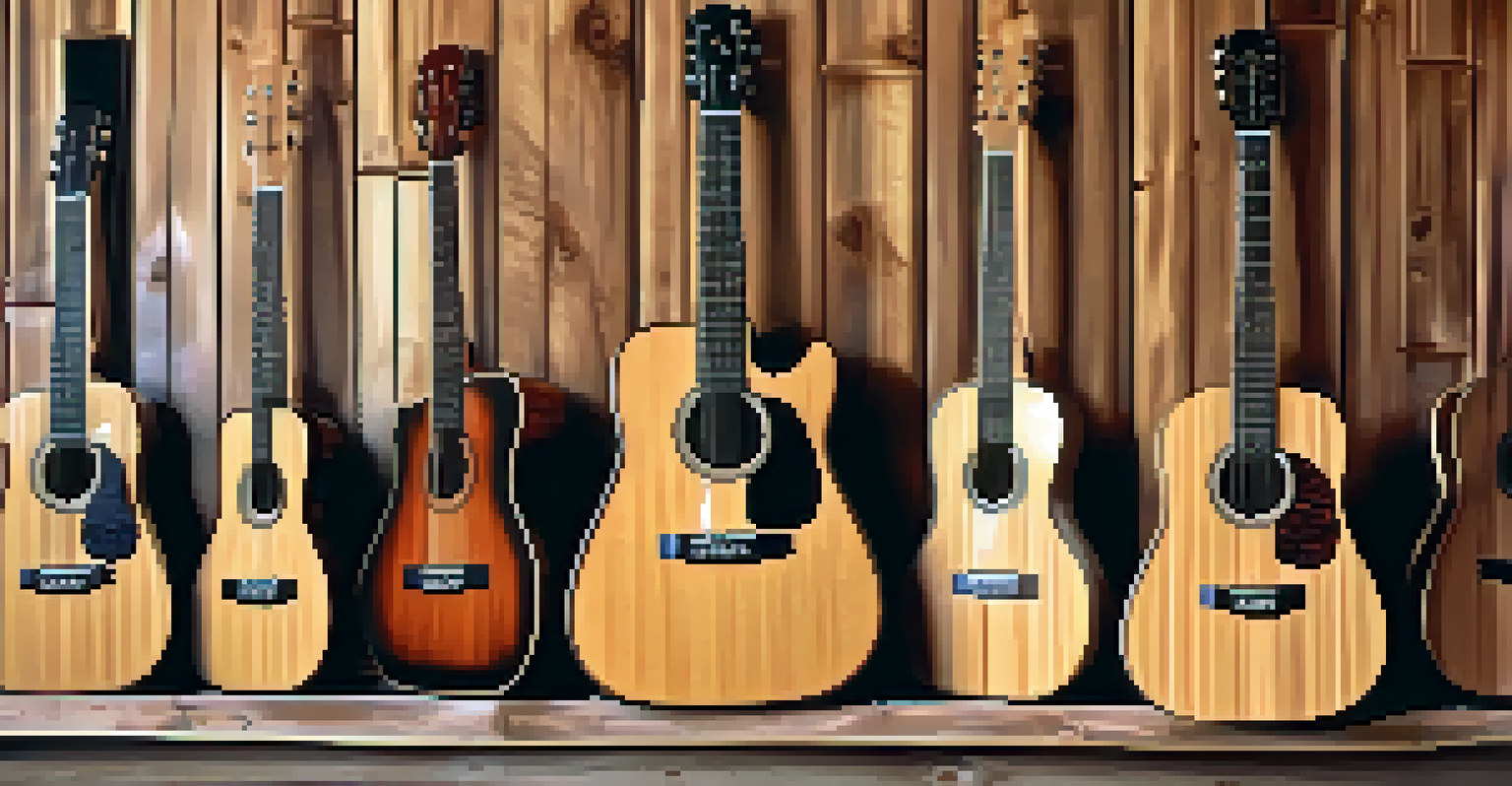Sustainable Woods: Eco-Friendly Innovations in Guitar Design

Understanding Sustainable Woods in Guitar Making
Sustainable woods refer to timber sourced from responsibly managed forests where trees are replanted and wildlife is protected. This practice not only helps in conserving the environment but also ensures that future generations can enjoy these natural resources. For guitar makers, using sustainable woods is an essential step in reducing their ecological footprint while still producing high-quality instruments.
The environment is where we all meet; where we all have a mutual interest; it is the one thing all of us share.
The shift towards sustainable woods is gaining momentum as musicians and manufacturers alike become more eco-conscious. For example, some brands are replacing traditional tonewoods with alternatives, such as bamboo or reclaimed wood, which offer unique sound qualities. This transition not only contributes to environmental sustainability but also encourages innovation in guitar design.
Moreover, using sustainable woods can enhance the instrument's story, adding sentimental value for both the maker and the player. When musicians know their guitars are crafted from eco-friendly materials, it fosters a deeper connection to the art of music-making. This emotional bond can elevate the overall playing experience.
Innovative Materials Revolutionizing Guitar Design
In recent years, guitar manufacturers have started experimenting with various innovative materials alongside traditional woods. For instance, manufacturers are utilizing composite materials and plastics made from recycled sources, resulting in durable and eco-friendly instruments. These materials not only reduce waste but often produce surprisingly rich tones that rival their wooden counterparts.

Another exciting development is the use of agricultural by-products, such as hemp or cork, in guitar construction. These materials can provide unique acoustic properties and add to the sustainability narrative of the instrument. By integrating such materials, guitar designers are pushing the boundaries of creativity while supporting sustainable practices.
Sustainable Woods Enhance Guitar Craft
Using sustainably sourced woods in guitar making not only protects the environment but also adds emotional value for musicians.
This innovation is not just about sound; it also encourages a shift in aesthetic design. Guitars made from these unconventional materials often showcase striking appearances, attracting musicians who want their instruments to stand out. As a result, eco-friendly guitars are not only kind to the planet but also visually compelling.
The Role of Certifications in Sustainable Wood Sourcing
Certifications play a crucial role in ensuring that wood used in guitar production is genuinely sustainable. Organizations like the Forest Stewardship Council (FSC) provide certification that guarantees the timber comes from responsibly managed forests. This gives consumers peace of mind and encourages them to make informed purchasing decisions.
Sustainability is no longer about doing less harm. It's about doing more good.
Many leading guitar brands are proudly displaying these certifications, highlighting their commitment to sustainability. For example, brands like Taylor Guitars have emphasized their use of FSC-certified wood, which not only enhances their brand image but also resonates with environmentally conscious consumers. This transparency fosters trust and loyalty among customers.
Additionally, these certifications can help drive industry-wide change by setting a standard for sustainable practices. As more manufacturers adopt certified materials, it encourages others to follow suit, creating a ripple effect that benefits the entire guitar-making community. This collective effort can significantly reduce the industry's impact on deforestation and habitat loss.
How Musicians Influence Sustainable Practices in the Industry
Musicians are powerful advocates for sustainability in the guitar industry. Their choices and preferences can significantly influence manufacturers to adopt more eco-friendly practices. As artists who often have a platform to share their values, many musicians are vocal about their commitment to using sustainable instruments and materials.
For instance, artists like Jack Johnson and Ed Sheeran have partnered with brands that prioritize sustainability, amplifying awareness of eco-friendly options. When fans see their favorite musicians playing guitars made from sustainable materials, it encourages them to consider similar choices in their own music journeys. This relationship between musicians and sustainability is a win-win for both parties.
Innovative Materials Drive Change
Guitar manufacturers are exploring new materials like recycled plastics and agricultural by-products, leading to eco-friendly instruments with unique sound qualities.
Moreover, the rise of social media has given musicians a larger platform to advocate for sustainable practices. Through posts and videos, they can showcase their instruments and share their stories, reaching a broader audience. This organic promotion of eco-friendly guitars can inspire a new generation of musicians who prioritize sustainability in their art.
Case Studies: Brands Leading the Eco-Friendly Charge
Several guitar brands are at the forefront of the sustainable movement, setting inspiring examples for others to follow. For instance, Gibson has recently launched a series of guitars made with sustainable woods and materials, demonstrating their commitment to environmental responsibility. This bold move not only enhances their brand reputation but also paves the way for industry standards.
Another notable example is the brand RainSong, which specializes in carbon fiber guitars. These instruments are not only durable and weather-resistant but also produced with a minimal environmental impact. By showcasing these innovations, RainSong proves that sustainability can coexist with high performance and sound quality.
These brands are not just selling guitars; they're telling a story of environmental stewardship that resonates with consumers. By focusing on sustainability, they attract a dedicated customer base that appreciates their efforts. This trend serves as a reminder that good business practices can go hand in hand with a commitment to the planet.
The Future of Sustainable Guitar Design
As awareness about climate change and environmental issues grows, the future of sustainable guitar design looks promising. Innovations in material science and production techniques will likely lead to even more eco-friendly options for musicians. This ongoing evolution will open doors for new sounds, aesthetics, and playing experiences.
The collaboration between musicians, manufacturers, and environmental organizations will continue to foster sustainable practices within the industry. As more artists advocate for eco-friendly instruments, manufacturers will feel encouraged to innovate and adapt. This synergy between art and sustainability can result in a vibrant, responsible music community.
Musicians as Eco Advocates
Artists influence sustainable practices by showcasing eco-friendly instruments, encouraging fans and manufacturers to prioritize environmental responsibility.
Ultimately, the future of sustainable guitar design is not just about reducing harm—it's about creating a positive impact. By prioritizing eco-friendly practices, the guitar industry has the opportunity to lead by example, inspiring other sectors to adopt similar approaches. This shift towards sustainability is not just a trend; it's a necessary evolution for the preservation of our planet and its resources.
Getting Involved: How You Can Support Sustainable Guitar Practices
As a music lover or aspiring guitarist, you can play a role in supporting sustainable guitar practices. Start by researching brands that prioritize eco-friendly materials and ethical production methods. By choosing to purchase from these companies, you're directly contributing to a more sustainable future in music.
Additionally, consider spreading the word about sustainable guitars within your musical community. Share information about your favorite eco-friendly brands and the benefits of sustainable practices. Engaging in conversations about sustainability can help raise awareness and encourage others to make conscious choices.

Finally, don’t hesitate to reach out to your favorite musicians and ask them about their stance on sustainability. Many artists appreciate hearing from their fans and may even consider adopting more eco-friendly practices if they know there’s demand. By collectively advocating for sustainability, we can create a vibrant and responsible music culture.